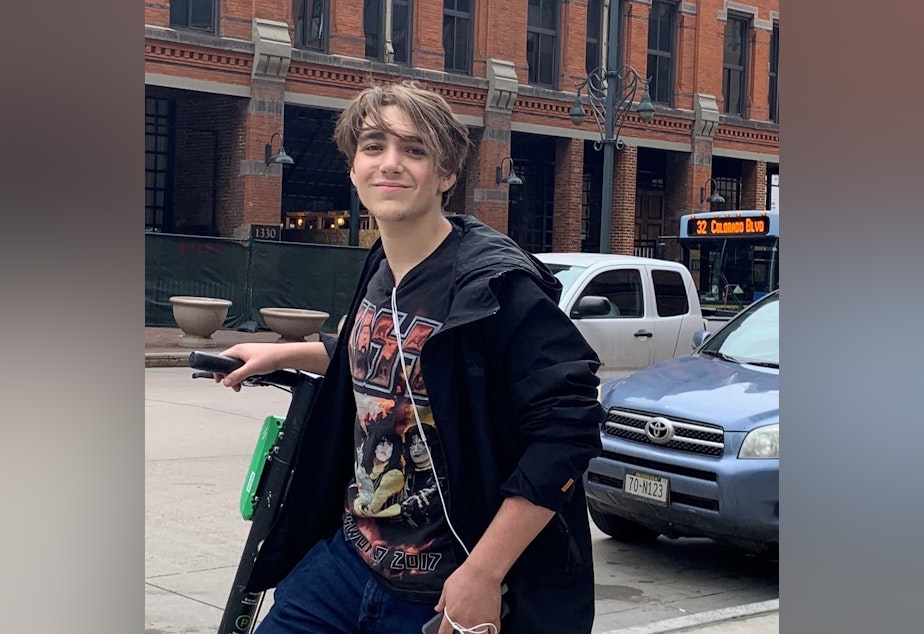‘We feel like there's a serial killer on the street.’ Fentanyl’s death toll in the Seattle area

Gabe Lilienthal, a Ballard High School student, died on September 29, after taking what he thought was oxycodone.
Public health officials say the counterfeit pill was laced with fentanyl, a synthetic opioid. Recently, three other high school students have died after taking fentanyl-laced pills.
So far in 2019, 65 people have died from fentanyl overdoses in King County.
Gabe's parents, Deborah Savran and David Lilienthal, described Gabe as a generous and warm young man.
“There's no words,” Lilienthal said, “There's none to completely encapsulate my son, our son. He was a compassionate man. He was a hardworking man.”
“He told me to give money away to homeless people. I carry a dollar in my pocket every day now to give it to someone who needs my attention and needs my help,” Lilienthal said. “He worked very, very hard for his money and he gave his money away. I was very proud of him for doing that.”
“Gabe came into this life with a ton of energy,” Savran said. “Up until he passed, as an almost 18-year-old man, he would see me and be like, ‘Mama, I love you. Why are you so cute and little?’ And he'd pick me up and throw me around. He was like a big puppy.”
Lilienthal said the night he died, Gabe was on the phone until 2:15 a.m., Snapchatting with a friend. And in that conversation, he just kept saying, “’I can't sleep. I can't sleep,’” Lilienthal said.
Sponsored
“Gabe certainly suffered from anxiety and insomnia. But let's be clear,” Lilienthal said. “My son didn't sleep very well. He took that poison to help him sleep. He didn't do drugs. He wasn't out partying every night.”
Savran and Lilienthal use the word “poisoned” rather than “overdosed” when they talk about their son’s death.
“Because what he took was poison,” Lilienthal said. “It wasn't a medicine. It was poison.”
“Every life is equally precious. Absolutely,” Savran said. And if someone is addicted to drugs and overdoses, “it's equally as great a loss as our son.”
“But we should be calling this a poisoning. People are presenting drugs, street drugs that aren't supposed to kill you — and they will kill you.”
Sponsored
“We feel like there's a serial killer on the street,” Savran said. “They're selling these drugs to people and it's like Russian roulette. This one might just make you sleep or take your pain away for a few hours.”
But then, she said, because it’s fentanyl, every third or fourth one might kill you.
“The difference is like a microdose of fentanyl. And just slightly bigger than a microdose is the difference between life and death,” she said. “That's why we're here speaking out in the midst of the most horrific days of our lives."
“We hope that being here will make a difference in other people's lives and change the culture on our streets, here in Seattle and beyond.”
King County Sheriff's detectives are still trying to track down who provided the counterfeit pills to Gabe and to two other teens who died recently in Sammamish.
Sponsored
Gabe is survived by his sister, Naomi, who is 15 years old and a sophomore at Ballard High School.
“She found Gabe,” Savran said. “She was the one who found Gabe and she tried to resuscitate him. He was already long gone. "
“He was her hero,” said Savran. “And they'd had a huge healing. You know how brothers and sisters can have a love/hate relationship. But in the last months Gabe matured, and he started being just super loving and supportive of her.”
“My heart was bursting because that's what parents would love for their children — that they can be there for each other in such a loving, beautiful way,” Savran said. “And that's what Naomi kept saying. ‘It's like I'm all alone. He was supposed to be there with me for my life.’”
“Losing a child, everybody says, is the hardest thing, but I'm not so sure if losing a brother is any easier than that, especially when he's so young,” Savran said.
Sponsored
In addition to educating people about the danger of counterfeit drugs, Lilienthal and Savran want to remind people of how quickly lives can change – and how precious our close relationships are.
“Life and death. It's like a switch turning on and off,” Lilienthal said.
If he had known what would happen to his son, he said, “Maybe I would have spent less time on the phone when he was with me.”
“I say to parents and children — Stop. Put your phones down. Look at each other. Love each other.”
Listen to the interview by clicking the play button above.





